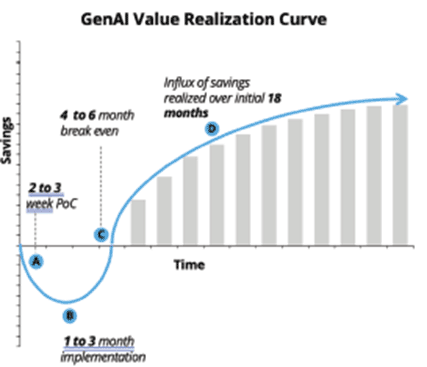Last week, I wrote a summary and review of the annual MHI report, now in its 11th year in partnership with Deloitte, which has made the study much more topical than the focus on the ups and downs of material handling equipment sales that was the emphasis prior to that. (See Highlights of the 2024 MHI Annual Report 2024.)
Based on a large survey of some 1700 supply chain managers, the report has a number of topical sections, with AI connected to most of them, in my opinion to a fault.
This week I am back to finish up my effort, looking at other key trends the report identifies, and several “calls to action” for supply chain leaders.
Gilmore Says.... |
 |
| |
With any prospective technology investment, it’s important [critical] to build a robust business case based on the true cost of implementing and using the solution |
What do you say? |
|
| Click here to send us your comments |
| |
|
|
|
The report lists five supply trends it says are currently impacting supply chains. They are published below:
1. Supply Chain Agility: Geopolitical concerns and on-going risks are impacting operations. The report says organizations need to ensure their supply chains center on flexibility and adaptability in the face of dynamic market conditions, geopolitical risk, and growing reshoring initiatives.
2. Rising Costs, including inflation and cost of capital: While inflation is easing in the US, firms will need to monitor and strategically manage rising costs globally and particularly in Europe.
3. Supply Chain Workforce: This includes the talent shortage and changing skill sets, report says, adding that automation is increasing overall worker satisfaction by making jobs better and more tech-forward. However, culture and flexibility are key in recruiting, retaining and re-skilling a high-achieving workforce.
4. Sustainability and Environmental, Social, and Governance (ESG): Measurement and reporting regulations are on the near-horizon, the report notes. It also says organizations must work with their suppliers to meet coming Net Zero goals and respond to risks associated with climate-related disruptions.
5. Visibility and Transparency: The report says supply chain leaders are prioritizing technology-driven investments and supplier collaboration that enhance real-time insights and foster trust across the value chain.
I am largely OK with this list except for the last one. Are companies really prioritizing investments that “foster trust across the supply chain?” I am not so sure.
The report concludes with several “calls to actions” for supply chain leaders.
That involves five focus areas that the report says “are paramount in helping an organization discover and integrate technologies that can simultaneously improve the human-centricity of its supply chain.”
Those five areas are:
Create an enterprise portfolio of technologies and initiatives: Start by conducting workshops (such as “Art of thePossible” sessions) to identify and prioritize all the different technologies and initiatives that could help create a more tech-driven and human-centric supply chain.
Identify specific use cases Identify potential for each technology/initiative in the portfolio: The goal is to better understand exactly how each technology/initiative could benefit the business.
Assess total cost of ownership (TCO) and build a business case: With any prospective technology investment, it’s important [critical] to build a robust business case based on the true cost of implementing and using the solution, the report notes. It recommends that “Instead of focusing solely on a solution’s required initial investments, a comprehensive total cost of ownership approach should be used to account for all costs and benefits over time. (See graphic below.)

Source: MHI/Deloitte
Identify and mitigate risks and ethical challenges: Another set of issues that must be considered, the report says, relate to risk management and mitigation. For AI and GenAI, potential risks and ethical issues that might arise from use of the technology include:
Systemic bias: Potential bias must be actively managed to ensure a system’s decisions and behavior are not unethical or discriminatory.
Privacy and confidentiality: Physical and logical access control mechanisms must be established to limit data access to appropriate personnel. Getting legal and technology experts involved early in the development process can help create effective controls for protecting personal data.
Plan a comprehensive approach for implementation and support: The report says that “Creating a collaborative supply chain that is both technology-driven and human-centric is a complex undertaking that requires a structured and comprehensive approach,” adding that “Such an approach is not a linear project plan but a broad framework that considers all aspects of what makes a technology transformation successful.”
So there you have it – think I will wrap things up here. There is lots of good stuff in the report, but it’s too much AI and it needs to stay more connected to core materials handling issues, in my opinion.
The full report is available from MHI here.
What is your reaction to this review of MHI's 2024 report? What would you add? Let us know your thought at the Feedback section below.
Your Comments/Feedback
|